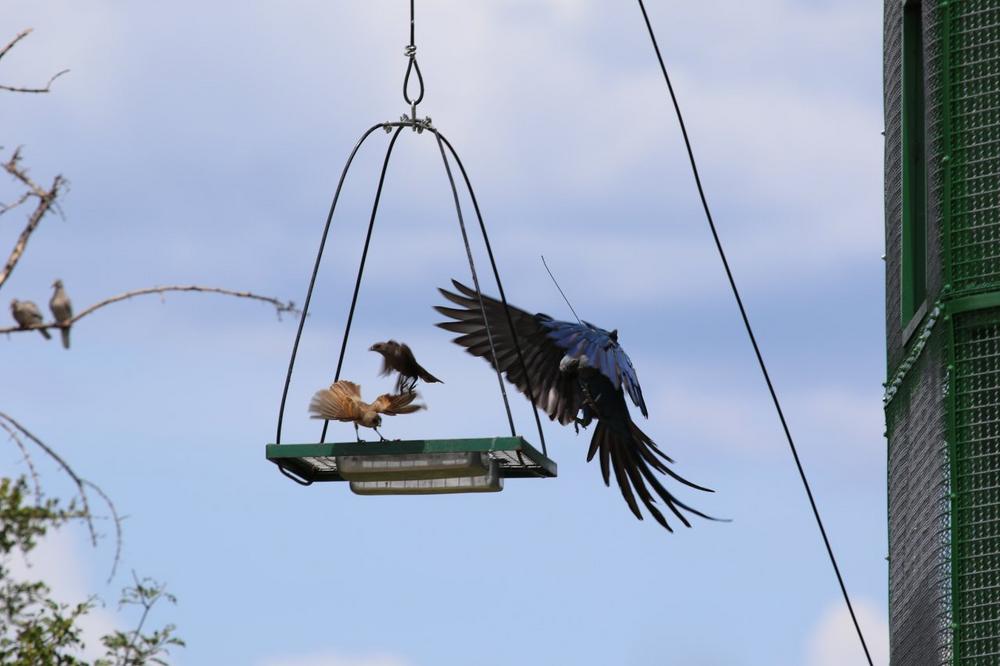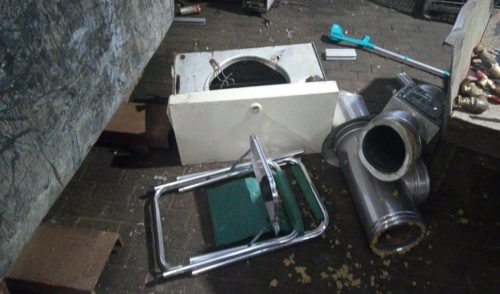
World Sensation: Return of a Parrot Species Extinct in the Wild – Project Updates
As the last time, the blue parrots will be accompanied by native Illiger macaws during the release. These nine companions will help the inexperienced Spix’s macaws navigate unfamiliar surroundings. This morning a group of interested people gathered to observe the ACTP Director Brazil and Manager of Spix’s Macaw Release Center at work in the release aviary. As usual, Dr. Cromwell Purchase fed the birds. Then he opened the aviary doors for the animals shortly afterward. After four Illiger macaws left the enclosure directly, the first and then more Spix’s macaws followed at around 7:00 am, a few minutes apart. The birds made short, inquisitive excursions and always returned to the aviary. A complete success!
With this release and today, more Spix’s macaws fly in Brazil’s skies than were ever seen in the wild before they became extinct in the wild! This is sensational and a sign of the success of this project. In Germany, the ACTP team is also working on the project’s next milestone. 40 Spix’s macaws, bred in Germany, will be transferred from Berlin to the Spix’s Macaw Release Center in Brazil early next year to increase the population there and be prepared for release.
Dr. Purchase takes a deep breath. He’s happy with how things went today. "With the clouds fading and the sun beating down, the birds settle down as the temperature increases. The rest of the day will be a calm back and forth of the birds in and out of the release aviary. We are all delighted!"
More information on the Spix’s macaw:
The Spix’s macaw has been renowned worldwide since the film "Rio." The animal was discovered around 200 years ago by the German naturalist Johann Baptist von Spix. Its original home is the Brazilian Caatinga, a Savannah landscape located in the northeastern federal state of Bahia. Today, the Spix’s macaw is one of the rarest birds in the world. Due to its distinctive blue color, it became a popular target for poachers and collectors worldwide in the past. Man’s destruction of its natural habitat and the illegal trade caused the population in the wild to decline steadily in the 1980s and 1990s until, in 1990, only one bird was living in the wild. Ten years later, the species was officially declared extinct in the wild by the International Union for Conservation of Nature (IUCN). Only a minimal number of privately-owned birds worldwide had survived. Breeding seemed impossible as the genetic pool was too limited to maintain a healthy genetic diversity in such a small population.
About ACTP e.V. – Association for the Conservation of Threatened Parrots e.V.:
Association for the Conservation of Threatened Parrots e.V. (ACTP) is a registered non-profit association. The association was founded in 2006 and has its headquarters in Berlin. He dedicated himself to protecting, preserving, and building up endangered parrot populations and their habitats. In 2008 the association bred the first Spix’s macaws in Berlin. Association website: act-parrots.org
About ICMBio:
A federal agency, responsible for the conservation programs in Brazil. It is the coordinator of the Spix’s-Macaw-Action-Plan and captive breeding program. It is the manager of the Spix’s macaw wildlife refuge and environmental protected area. Agency website: gov.br/icmbio/pt-br
more information: spixs-macaw.org
hashtag: #spixsAreComingHome
more footage: vimeo.com/actp
ACTP e.V. – Association for the Conservation of Threatened Parrots e.V.
Non-Profit Organization, Non-Governmental Organization
ACTP e.V. is a registered non-profit association based in Germany. We dedicate our work to protecting and preserving endangered parrots and their habitats. The most famous breeding project to date involves the reintroduction of the Spix’s Macaw, which has been extinct in the wild for over 20 years.
(Engl) ACTP e.V. – Association for the Conservation of Threatened Parrots e.V.
Hindenburgstraße 37
30175 Hannover
Telefon: +49 (33638) 896060
Telefax: +49 (33638) 895899
http://www.act-parrots.eu
Director ACTP Germany
E-Mail: press@act-parrots.eu
![]()




